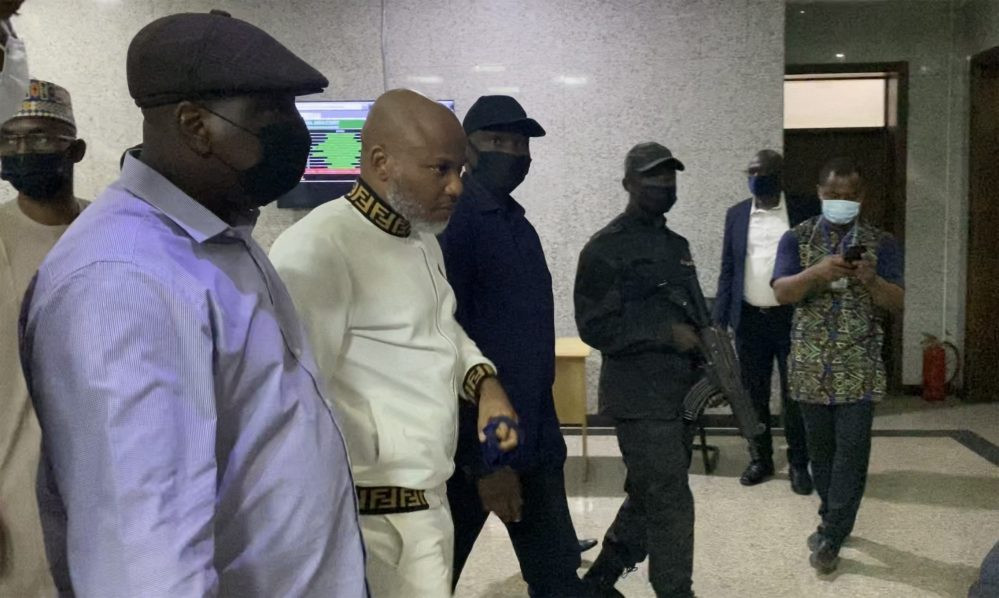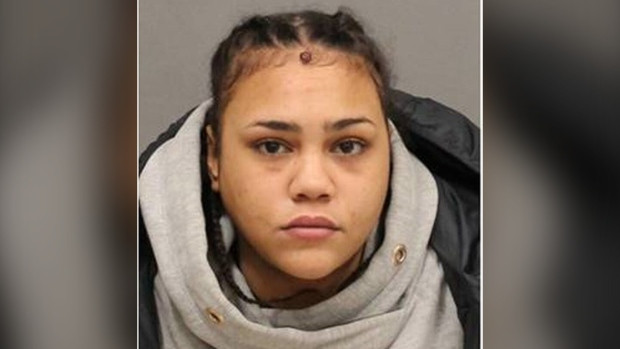The trial of Nnamdi Kanu, the detained leader of the proscribed Indigenous People of Biafra (IPOB), took a dramatic turn on Tuesday as Justice Binta Nyako of the Federal High Court in Abuja recused herself from the case. This development follows Kanu's direct appeal to the judge, expressing his lack of confidence in her ability to preside over his trial fairly.
Kanu's legal team had attempted to persuade the court to suspend the trial, citing his lack of preparation for his defense. However, Kanu unexpectedly interrupted his lawyer, ordering him to sit down and directly addressing Justice Nyako. He stated, “I no longer have confidence in you, recuse yourself.”
Kanu's request stemmed from his belief that the court had not upheld the rulings of the Supreme Court, which had questioned the jurisdiction of the lower court and criticized the revocation of his bail. He argued that Justice Nyako had consistently ignored these rulings, leading him to lose faith in her impartiality.
Despite attempts by the prosecution counsel to urge the court to proceed with the trial, Justice Nyako agreed to step down. She acknowledged that she could not continue with a trial where the defendant lacked confidence in her ability to deliver justice. She stated, “I actually dey happy to recuse mysef from dis case and dat na wetin I go do. I go forward di case file to di Chief Judge of di Federal High Court for further action.”
The case file has now been forwarded to the Chief Judge of the Federal High Court for reassignment to another judge, and the trial will begin anew. It is unclear when this will occur, but it means that Nnamdi Kanu will remain in the custody of the Department of State Services (DSS) until the case is reassigned.
The Impact of the Recusal
The judge's recusal marks a significant turning point in the ongoing trial of Nnamdi Kanu. It is a clear indication that the case has entered a critical phase, with the possibility of a new judge potentially bringing a fresh perspective and a different approach to the proceedings. This development has raised numerous questions about the future of the trial, including the potential impact on the prosecution's case and the timeline for the proceedings. The decision to recuse herself could also be interpreted as a reflection on the challenges of maintaining public confidence in the judiciary, particularly in high-profile cases involving politically sensitive issues.
Repercussions for the Trial
This development has significant implications for the future of Nnamdi Kanu's trial. It is unclear how the reassignment of the case will affect the timeline for the trial, as the new judge will likely need to familiarize themselves with the case's complexities. The recusal also raises concerns about the potential for delays in the trial, as the new judge may need to revisit previous rulings and arguments made before the court. Moreover, it remains to be seen whether the prosecution's strategy will be adjusted in light of the new judge, or whether the case will proceed as initially planned.
Public Perception of the Judiciary
This event highlights the challenges faced by the Nigerian judiciary in maintaining public confidence in its ability to deliver fair and impartial justice. Nnamdi Kanu's public accusations of bias against Justice Nyako, and her subsequent recusal, have prompted discussions about the potential for judicial bias and the need for greater transparency and accountability in the legal system. These discussions are likely to continue as the trial proceeds under a new judge, with the public closely watching to see whether justice will be served fairly and transparently.
The Road Ahead
The recusal of Justice Binta Nyako from the trial of Nnamdi Kanu signifies a new chapter in this high-profile case. The assignment of the case to a new judge will inevitably bring a fresh perspective to the proceedings, but it also raises questions about the potential for delays and the broader implications for the Nigerian judicial system. As the trial progresses, it will be crucial to monitor developments closely to see how the new judge handles the case and whether the justice system can effectively address the concerns raised by Nnamdi Kanu's accusations of bias.
The Future of Nnamdi Kanu's Trial
The reassignment of Nnamdi Kanu's case to a new judge will be a defining moment for the trial. The new judge will have to consider the previous rulings, arguments, and evidence presented before the court, as well as the concerns raised by Nnamdi Kanu and his legal team. This new chapter presents an opportunity for a fresh start, with the potential for a more fair and impartial trial. However, it also highlights the challenges faced by the judiciary in maintaining public confidence and ensuring that justice is served effectively and transparently.

















